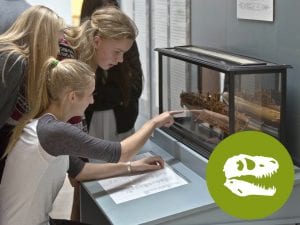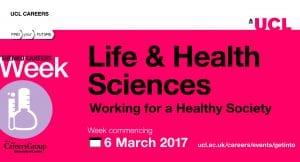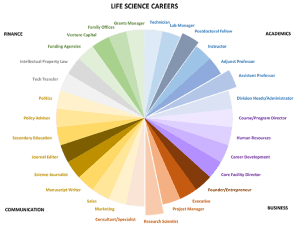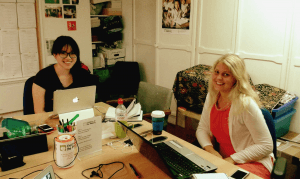
Next week UCL Careers hosts Museums & Cultural Heritage Week, a series of panel events featuring panellists working in museums, cultural heritage and the arts. Each forum will feature expert speakers who will provide insight on the sector by sharing their own career journeys, their perspectives on what is currently driving the sector and what keeps them excited about this field. This series will offer the perfect opportunity for you to gain insight on the range of careers available and how you can launch your own career in this competitive but exciting sector. So if you’re interested in working in this industry sign-up to attend any of the panels to learn more.
The series begins with the Museums Forum taking place Monday 14 November which will include speakers from the Grant Museum, the Museum of London and the Victoria and Albert Museum (V&A). Read more about the featured panellists here.
On Tuesday 15 November the Cultural Heritage Forum takes place following the Museums & Heritage Volunteering Fair. This forum features six panellists:
Joe Flatman, Head of Listing Programmes, Historic England. Joe heads up the teams that lead on the delivery of the national statutory casework process. This includes listing historic buildings, scheduling archaeological sites and protecting wrecks, among other responsibilities. His teams also provide central support and liaison with the Department of Culture, Media & Sport DCMS, and promote the increase in designation activity through guidance, training, outreach and art policy development.
Gai Jorayev has worked with professional and research-led heritage projects over the last decade. He is responsible for the development and supervision of projects on behalf of the Centre for Applied Archaeology (Institute of Archaeology, UCL). He has extensive experience of working collaboratively on large-scale projects in different parts of the world and his current research is closely linked with initiatives of international organisations such as UNESCO, ICOMOS and UNWTO. He is involved in the ongoing UNESCO-led serial World Heritage nomination of the Silk Roads.
Freya Stannard entered into her first job in the cultural heritage sector in 2011. She worked as Assistant Secretary to the Reviewing Committee on the Export of Works of Art at the Museums, Libraries and Archives Council. Completing the Cultural Heritage Studies MA at UCL in 2012, she gained work experience with the Portable Antiquities Scheme administered by the British Museum. She spent two years working at Tate in two roles which focused on acquisitions and spoliation research. She then started in her current role in November 2015 as Manager of the Acceptance in Lieu and Cultural Gifts Schemes at Arts Council England.
Liz Vinson, Director at the Heritage Collective. Liz advises architects, developers, home owners and local authorities on the historic environment. Her experience includes but is not limited to numerous heritage assessments for listed buildings, sites in conservation areas and registered parks and gardens. She is experienced at EIA, especially with regard to wind farms, and including public inquiry work.
Sara Serafi currently works as an Assistant Heritage Consultant at Atkins’ London office. Her training and work experience as an Architect both in Saudi Arabia and the UK has allowed her to experience working on a wide range of worldwide projects that offer varying perspectives and approaches. She holds an MSc in Sustainable Heritage from University College London. She is particularly interested in the intangible dimension of heritage that relates to community inclusion and engagement.
Plus, a recent UCL graduate currently working at the Museum of London Archaeology will also participate. Having graduated with a BA in Egyptology, in 2014 Ashley completed an MA in Museums and Galleries in Education at the Institute of Education which complements almost a decade of experience working in education and heritage. Before joining MOLA he spent a number of years both working and volunteering with the National Trust at various sites across the south of England in various education and volunteer-leading roles, as well as working for Orleans House Gallery and the Mary Rose Trust and Imperial War Museum.
Finally, the series ends Wednesday 16 November with the Working in the Arts forum. This event will feature expert panellists representing diverse roles in arts management and administration at some of London’s major organisations, as well as freelance producers. Panellists for this event include:
Marion Crick, Head of Collections Management at the Victoria and Albert Museum. Prior to this she was Collections Information and Systems Manager, also at the V&A.
Emma Double, Assistant Press Officer at Tate. Emma is also an arts writer and blogger with numerous online publications, including with One Stop Arts London, Mouth London Magazine, One & Other Magazine and her personal blog.
Kate Rolfe, Head of Events at the National Gallery, provides strategic oversight of all events held at the National Gallery. Kate was previously Head of Visitor Events at the Natural History Museum.
Anne Wareing, Senior Development Manager at Battersea Arts Centre. After starting her career in arts fundraising in the States, Anne relocated to London in 2010. She has been with Battersea Arts Centre for four years and focuses on individual giving while also managing the organisation’s overall fundraising strategy. She is also obsessed with DataVis as a tool for impact reporting and evaluation.
Nadezhda Zhelyazkova is a freelance theatre producer. She incorporated her own production company last year with the aim of creating theatre that examines the pressing issues of our society. The company recently finished the run of its inaugural production Wasted, a play about consent.
This is your opportunity to meet specialists working in this sector and learn more about how you can launch your own career in this industry. Register to attend this and the other events online via your ‘My UCL Careers’ account.
UCL Careers Museums & Cultural Heritage Week is part of the #UCLInspireMe series.
Further details on the events in this series:
- Museums Forum, 14 November @ 17:30
- Museums & Heritage Volunteering Fair, 15 November @ 17:00
- Cultural Heritage Forum, Tuesday 15 November @ 18:30
- Working in the Arts, Wednesday 16 November @ 17:30
 Close
Close










